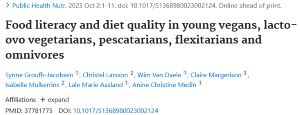Young Vegans in Norway Score Higher on Nutrition Literacy and Diet Quality Than Omnivores
By Reed Mangels, PhD, RD
Researchers in Norway recently published a study comparing nutrition knowledge and diet quality in vegans, lacto-ovo vegetarians, fish eaters, flexitarians (defined as those trying to reduce their consumption of animal foods), and omnivores.
What is the study?
A total of 165 Norwegians, age 16-24 years, who had adhered to their current diet for at least 6 months, were recruited to participate in this study. Participants completed a questionnaire about their physical activity, sleeping habits, food literacy, and diet. Based on their responses to the questionnaire they were categorized as
- Vegan (never ate animal products) – 11.5% of subjects
- Lacto-ovo vegetarian (never ate meat, poultry or fish but ate dairy products and/or eggs) – 12%
- Fish eaters (never ate meat but ate fish; may or may not eat eggs and/or dairy products) – 18%
- Flexitarians (included less than 2 servings per week of poultry and/or meat) – 15%
- Omnivores (ate 2 or more servings per week of poultry and/or meat) – 43%
Food literacy was assessed based responses to questions about general nutrition knowledge, critical nutrition literacy (being able to think critically about and act on food and nutrition issues), and food skills (ability to shop for and cook food).
The researchers compared the responses of the different groups.
What did this study find?
Vegans scored higher on critical nutrition literacy than the other groups did. Vegans also had higher quality diets than omnivores or fish eaters. The higher dietary quality score was due in part to vegans eating more vegetables, nuts and seeds, and dried beans and drinking fewer sugar-sweetened beverages. The groups ate similar amounts of fruit, whole grains, sugary food, and salty food.
Food skills did not differ between the groups with more than half of study subjects reporting that they were responsible for their own food shopping and that they prepared home-made foods daily. There was a correlation between higher scores on general nutrition knowledge and higher diet quality scores.
What are the study’s limitations?
This study only looked at a small number of vegans in Norway so can’t be generalized to vegans in other countries or other age groups.
Are there practical implications?
This study suggests that young adult vegans can have good quality diets and that they may be more aware of critical issues in nutrition.
Groufh-Jacobsen S, Larsson C, Van Daele W, et al. Food literacy and diet quality in young vegans, lacto-ovo vegetarians, pescatarians, flexitarians and omnivores. Public Health Nutr. Published online October 2, 2023.

